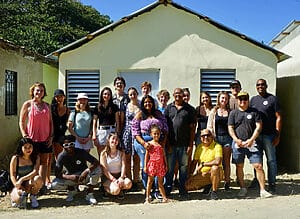8 mental wellness tips for creating an inviting classroom
In our books, there’s no job more important than teaching!
Teachers are the guiding lights that illuminate young minds and shape the future. From the early morning greetings to the late-night lesson planning, your dedication knows no bounds. You create safe havens where students can flourish, allowing them to embrace their unique talents and discover their passions.
Your impact extends far beyond the classroom walls.
Teachers have the incredible opportunity to not only educate students academically but also to nurture their overall well-being. By incorporating mental wellness education into classrooms, you can empower students with essential skills and strategies that will benefit them throughout their lives.
To help with this mission, we’ve provided eight practical tips to help teach students about mental wellness. Inspired by our Circles Program, these tips will help students develop empathy, resilience, self-care practices and emotional intelligence.
8 mental wellness tips to use in your classroom
By gathering around a shared set of values and agreements, students are invited to show up in ways that foster brave space. We use these tips when gathering to have meaningful conversations about things that matter, but they can also apply within your classroom and beyond.
Commit to kindness
Cultivate a culture of kindness in your classroom. Teach students to recognize and respect the emotions and experiences of others, and show them that caring for others contributes to their own well-being as well. Encourage acts of kindness, empathy-building activities, and opportunities for students to support and uplift their peers.
Classroom example: Create a “compliment chain”. Hang a string or chain along one of the walls and encourage students to write anonymous compliments on small pieces of paper and attach them to the chain. This could be something they appreciate about a classmate’s personality, a helpful action they witnessed or a talent someone possesses.
Desire to develop
Remind students that each of us has the potential to become a better version of ourselves, and increase eagerness to learn and grow. Encourage student growth through self-reflection and guide students in reflecting on their thoughts, feelings and actions.
Classroom example: Have students keep a daily gratitude, emotions or self-care journal, and help them identify patterns, triggers and areas of personal growth.
Connect in cause
Students benefit when they understand their life experience is not just about their individual selves, but how we as a group can make a meaningful impact on the world around us. Rally your students to get involved in the school or wider community through volunteering or acts of kindness.
Classroom example: Identify volunteer opportunities through school clubs or events, start a fundraiser or collect donation items for a local charity, or research one cause that students can start raising awareness about.
Enforce a judgment-free zone
When we encourage students to drop their judgments and simply listen with open hearts, that is where meaningful connections flourish. Create an environment where students can feel comfortable discussing their emotions and experiences. Encourage open dialogue about mental health and well-being, allowing students to share their thoughts, concerns and questions without judgment.
Classroom example: Use initiatives like LiveDifferent’s Peer Mentorship Program in the classroom. This program was designed to build community and develop both leadership and personal development in students. It includes videos, resources and material needed for students to have discussions around authenticity, empathy, growth mindset, resilience, values and altruism.
Honour personal stories and boundaries
Building trust among peers takes a lot of courage, and one way to honour that is by encouraging students to keep stories that are shared in the classroom experience within the classroom (unless it concerns anyone’s safety).
Classroom example: Collaboratively create a “Circle of Trust” agreement. Explain that this doesn’t mean students can’t talk about what they’ve learned or discussed, but rather they won’t share identifying details or personal experiences that others have shared without permission. This agreement can be written down and displayed in the classroom, serving as a visual reminder of the commitment they’ve made.
Choose to share, pass or come back to me
Any time you are asking students to be brave in the classroom space, employ options that make them feel OK to pass on a question, share as little as they are comfortable with, or if they need more time before answering, employ the choice to “come back to me.” Options, options, options!
Listen deeply one person at a time
Whenever possible, encourage students to listen deeply, without interrupting others. Encourage students to engage not to debate or argue, but to primarily make people feel heard, seen and understood.
Classroom example: Show students this video and have them R.A.P: Reflect, ask and posture. Have students pair up in this listening exercise, and have them reflect back on what their partner says to them, ask questions about it, and ensure they have good posture and look friendly to show they’re listening.
Normalize seeking help
Reduce the stigma surrounding mental health by normalizing the act of seeking help. Discuss the availability of support systems within the school, such as counsellors or psychologists. Remind them that they are not alone and teach students that reaching out for help is a courageous and essential step toward maintaining their mental wellness.
Classroom example: Invite mental health professionals, counsellors or individuals with lived experiences to speak to your students. You can also redirect students to the resources available at your school or the Crisis Text Line.
Dive deeper with Circles
By integrating mental wellness education into classrooms, you can empower students with lifelong skills to navigate the challenges they may face.
LiveDifferent’s Circles program can help you put the above tips into practice. It is designed to help young people explore important values, build stronger relationships and get activated in kindness, leaving your youth more compassionate, resilient and hopeful. Book a discovery call today to learn how Circles can work in your school or classroom.
As teachers, you have the power to shape not only students’ academic success but their overall happiness and resilience. Let us embrace our roles as mental wellness advocates and guide students toward a brighter, healthier future!






